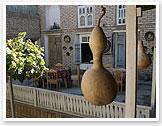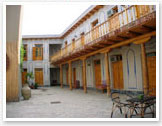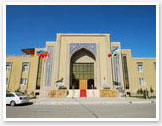Bukhara, to which the epithets "blessed" and "sacred" are ascribed, is the real center of Islamic culture. Today it numbers more than 360 mosques of different eras. But Islam apart, the city has Christian churches and Jewish synagogues. However, if you look into the far past, you will see that Zoroastrianism, Buddhism, Manichaeism and other religions were preached here.
One of the first religions here was Zoroastrianism, or the fire-worship. The representatives of this religion preserved in Bukhara up to the XVIII century, and even the famous Samanid Mausoleum of the X century is the model of Zoroastrian architecture. However, this religion was supplanted by Islam: the Arabs, conquering Bukhara, tried to build mosques on the sites of Zoroastrian temples.
Another quite ancient religion, presented in these lands, was Buddhism, which was spread by pilgrims from India. There is even conjecture that the name of Bukhara originates from the word «vi-hara», which in Sanskrit means "Buddhist monastery." However, traces of this religion did not remain in the city.
Judaism in Bukhara exists in the city as long as Buddhism and Zoroastrianism. This is due to the fact that there were trade routes connecting China, India, Iran, Iraq, Middle East, the Caucasus and other regions. Merchants from different countries and different religions constantly appeared in the city – all this contributed to religious tolerance among the residents, merchants and travelers. Unlike other religions, Judaism preserved in Bukhara after the spread of Islam. There is even the Magoki-Attari Mosque, in which once Muslims and Jews had prayed. Interesting fact, this mosque was built on the site of Zoroastrian temple dedicated to the god of the Moon.
Christianity was also represented in Bukhara: it was presented insufficiently before the spread of Islam, and appeared again during the period of colonial conquest of Asia by Russian Empire. Chashmai Ayub (Job Source) Mausoleum can be considered as one of the monuments of Christian culture, which was also sacred to Muslims and Jews.
In the VII century, Bukhara was conquered by the Arabs who started imposing Islam here. Locals changed their religion with reluctance, and only when power was transferred to the local aristocracy, the process of adoption of new religion went faster. It was promoted by the construction of mosques on the site of temples of other confessions. Today, Islam is the leading religion not only of Bukhara, but of the whole Central Asia, and the city is sometimes called as "the second Mecca", "Dome of Islam", and thousands of pilgrims annually make the hajj to this holy city.
In addition, in the city there were other religions and cults that virtually did not leave trace in the history of the city, but Bukhara will forever remain the symbol of religious tolerance.
| English Русский |
HOTELS BY NAME
HOTELS BY RATING
TOP SIGHTS
- Kalyan Minaret
- Samanid Mausoleum
- Magoki-Attari Mosque
- Chor-Minor Madrassah
- The Ark Fortress
- Poi-Kalyan complex
- The Labi-Hauz Ensemble
- Necropolis Chor-Bakr
RECOMMENDED HOTELS







